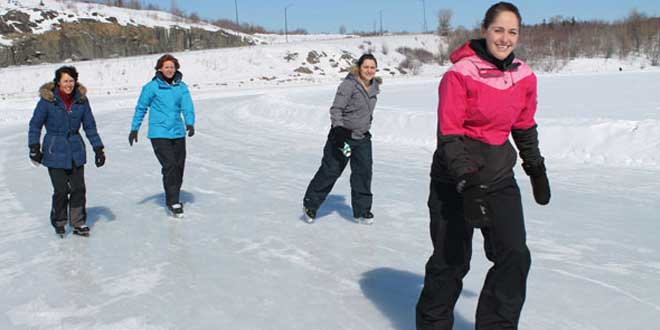Meet Christine Spence, Physiotherapist with HSN’s Outpatient Physiotherapy Department (pictured above in pink).
March Break is an exciting time of year. Children have a week off school and look forward to enjoying the sun, fresh air, exercise and pulling out all their winter sports gear. Unfortunately, each year Christine and our Physiotherapists see an increase in injuries associated with winter activities during March Break.
Common injuries include strains, sprains, dislocations and fractures. These injuries often occur as a result of inexperience, deconditioning and fatigue at the end of a long day outdoors. The majority of these injuries can easily be prevented if participants properly prepare for their sport. This can be done by keeping in good physical condition, staying alert, and stopping when tired or in pain.
Here are some tips to prevent injuries and stay safe during your March Break!
Wear protective equipment
- Helmets for downhill skiing and snowboarding
- Helmets for young and beginner skaters
- Boots with good treads to avoid slipping in icy conditions
Dress warm and in layers
- Muscles, tendons and ligaments are more vulnerable to injury when they are cold
- Avoid overheating your body by dressing in layers. You can take off and add layers as necessary
- Avoid exposing skin to the cold and wind to avoid frostbite
If you have pain…STOP!
- Pain is a warning that something is injured. Do not ignore this warning – your body is talking to you… listen to it!
Inspect sports equipment before using
- Most people pull out equipment that has been stored in the basement or garage all year long. Inspect for defects before you hit the slopes or trails
- Store properly when not in use
Warm up
- Research now recommends:
- Ballistic stretches and an easy cardio warm up before your activity
- Static stretches to cool down after your activity. Hold stretches for at least 30 seconds… pain free!
- Ease into your activity! Start slowly and gradually increase the intensity, speed and level of difficulty
Do not overdo it
- Listen to your body – activities that you don’t do regularly will make you fatigue more quickly.
- Fatigue leads to injuries – pace yourself and take frequent breaks
Know your limits!
- Take lessons from qualified instructors, especially in sports like skiing and snowboarding
- Learning how to fall correctly and safely can reduce the risk of injury





